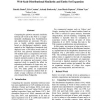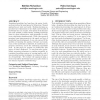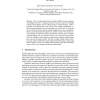624 search results - page 37 / 125 » The Tradeoffs of Large Scale Learning |
ICASSP
2011
IEEE
12 years 11 months ago
2011
IEEE
In this paper, we revisit the noise-reduction problem in the time domain and present a way to decompose the ltered speech into two uncorrelated (orthogonal) components: the desire...
EMNLP
2009
13 years 5 months ago
2009
Computing the pairwise semantic similarity between all words on the Web is a computationally challenging task. Parallelization and optimizations are necessary. We propose a highly...
ICML
2009
IEEE
14 years 8 months ago
2009
IEEE
Sparse coding--that is, modelling data vectors as sparse linear combinations of basis elements--is widely used in machine learning, neuroscience, signal processing, and statistics...
KCAP
2003
ACM
14 years 1 months ago
2003
ACM
Acquiring knowledge has long been the major bottleneck preventing the rapid spread of AI systems. Manual approaches are slow and costly. Machine-learning approaches have limitatio...
SAT
2005
Springer
14 years 1 months ago
2005
Springer
Solvers for Quantified Boolean Formulae (QBF) use many analogues of technique from SAT. A significant amount of work has gone into extending conflict based techniques such as co...



